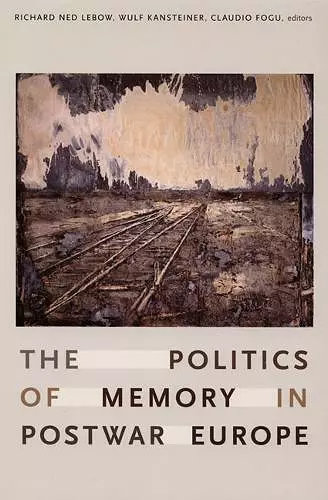The Politics of Memory in Postwar Europe
Richard Ned Lebow editor Wulf Kansteiner editor Claudio Fogu editor
Format:Hardback
Publisher:Duke University Press
Published:20th Sep '06
Currently unavailable, and unfortunately no date known when it will be back

Considers intersection between history and memory in seven European countries with emphasis on social narratives that have emerged surrounding World War II and implications of that process for the development of democracy.
Comparative case studies of how memories of World War II have been constructed and revised in France, Germany, Austria, Switzerland, Poland, Italy, and the USSR (Russia).For sixty years, different groups in Europe have put forth interpretations of World War II and their respective countries’ roles in it consistent with their own political and psychological needs. The conflict over the past has played out in diverse arenas, including film, memoirs, court cases, and textbooks. It has had profound implications for democratization and relations between neighboring countries. This collection provides a comparative case study of how memories of World War II have been constructed and revised in seven European nations: France, Germany, Austria, Switzerland, Poland, Italy, and the USSR (Russia). The contributors include scholars of history, literature, political science, psychology, and sociology. Country by country, they bring to the fore the specifics of each nation’s postwar memories in essays commissioned especially for this volume. The use of similar analytical categories facilitates comparisons.
An extensive introduction contains reflections on the significance of Europeans’ memories of World War II and a conclusion provides an analysis of the implications of the contributors’ findings for memory studies. These two pieces tease out some of the findings common to all seven countries: for instance, in each nation, the decade and a half between the late 1960s and the mid-1980s was the period of most profound change in the politics of memory. At the same time, the contributors demonstrate that Europeans understand World War II primarily through national frames of reference, which are surprisingly varied. Memories of the war have important ramifications for the democratization of Central and Eastern Europe and the consolidation of the European Union. This volume clarifies how those memories are formed and institutionalized.
Contributors. Claudio Fogu, Richard J. Golsan, Wulf Kansteiner, Richard Ned Lebow, Regula Ludi, Annamaria Orla-Bukowska, Heidemarie Uhl, Thomas C. Wolfe
“A stimulating addition to the literature on the intersection between memory and history, this collection is an intelligent and robust engagement with issues that simply won’t go away. One of its advantages is that it takes seriously the need to sharpen the conceptual tools we need to handle a subject as protean as memory.”—Jay Winter, author of Sites of Memory, Sites of Mourning: The Great War in European Cultural History
“This is not the first collaborative volume on post–World War II memory in Europe to appear in recent years, but it is the best and most important. Two qualities that set it apart are the integration of excellent historical writing with a stimulating social-science framework and the broadly humanistic cultural sensibilities embodied in the country-specific chapters. The book will be read with benefit by students of history and political psychology, as well as by those interested in the comparative politics of the past.”—Martin O. Heisler, University of Maryland
ISBN: 9780822338024
Dimensions: unknown
Weight: 685g
384 pages